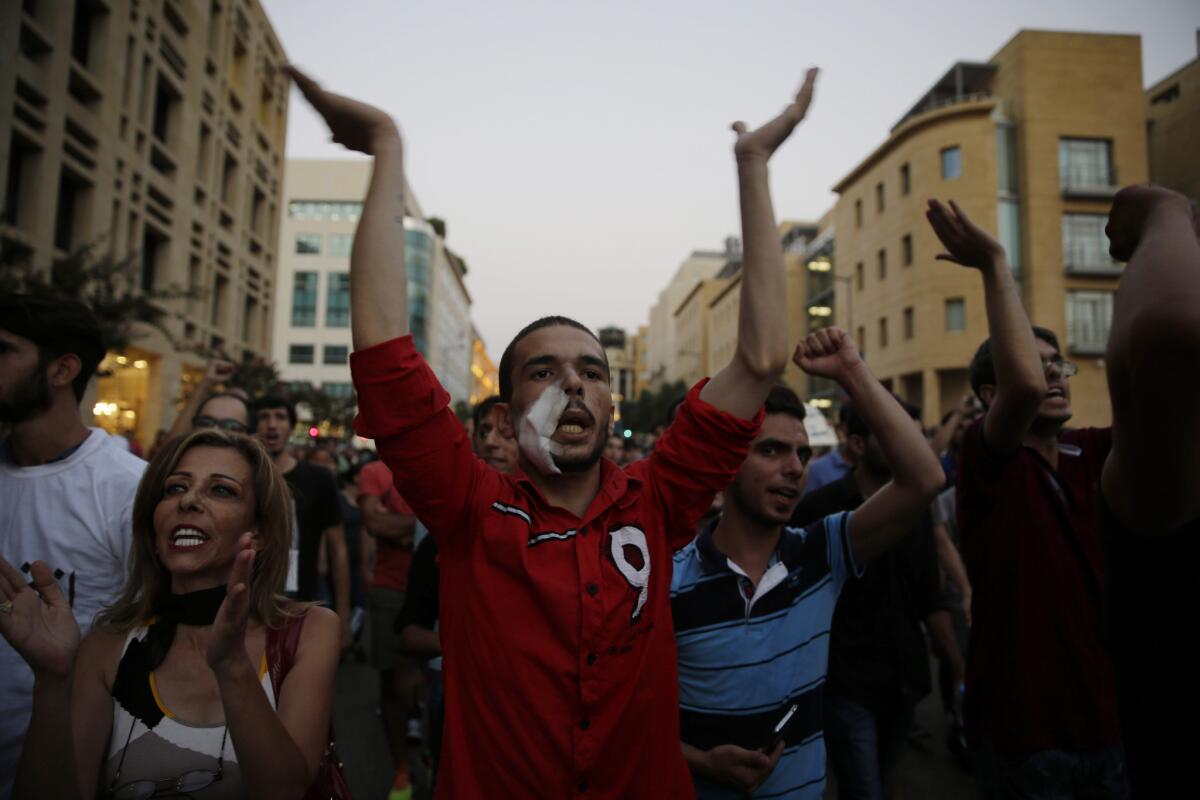Protesters raise a stink as Lebanon’s garbage crisis worsens

Lebanese activists chant slogans during a protest over uncollected trash and government ineptitude in downtown Beirut, on Aug. 26, 2015.
Reporting from Beirut — Protesters took to the streets Wednesday in Lebanon’s capital, where demonstrations over uncollected trash have grown into a movement calling for the fall of the government.
Beirut has been shaken by daily unrest since the weekend, when security personnel deployed tear gas, rubber bullets and water cannons to break up two massive demonstrations. Enraged protesters retaliated with barrages of rocks. Hundreds of injuries were reported on both sides.
The campaign known as “You Stink” was sparked by the government’s inability to handle waste disposal in the capital, where trash has been piling up since the main landfill was closed more than a month ago. It has since escalated into a wholesale rejection of Lebanon’s sectarian-based power-sharing system.
Shifting alliances between Lebanon’s 18 recognized religious sects have often paralyzed the parliament, which has been unable to elect a president for more than a year, even as it extended its own term to 2017 in a move condemned by critics as unconstitutional.
A full-blown sectarian war in neighboring Syria and a refugee crisis with no end in sight have exacerbated internal division, leaving the unity government seemingly powerless to address an array of indignities endured by its citizens, including electricity cuts, water shortages and some of the worst violence since Lebanon’s own 1975-90 war.
“The trash issue was the straw that broke the camel’s back,” Prime Minister Tammam Salam said at a televised news conference Sunday at Grand Serail, the government’s Ottoman-era headquarters in Beirut’s glitzy commercial district. “But the story is larger, much larger than this straw, and it is the story of the political trash in the country.”
NEWSLETTER: Get the day’s top headlines from Times Editor Davan Maharaj >>
The protesters have been demanding Salam’s resignation, a move he hinted he might make if an emergency parliamentary session planned for Thursday doesn’t yield a solution to the crisis.
Demonstrators, meanwhile, have stationed themselves less than half a mile away, chanting slogans like “Revolution!” and a call made famous by the Arab Spring uprisings that swept the region in 2011: “The people want the regime to fall.”
“Look at us, we’re four guys here, all in our 20s, and none of us have any work,” said Wael, who joined the crowd late Tuesday with three friends. Like others, he refused to give his last name, citing security concern.
“Then you talk about water, electricity and now garbage! Why wouldn’t we come down here to protest?”
Nearby stood Hadi, a 45-year-old bank employee with a shaved head and wrestler-like build.
“My work frowns upon us participating in these demonstrations, but my daughter insists we come,” he said.
At his side was his daughter, Rawan, a shy 13-year-old with a bandanna tied under a pair of large, thick-framed black glasses.
“I want to participate in this for Lebanon and remove the trash from this country,” she said.
The protests have repeatedly teetered into chaos, with security forces sprinting toward the crowds with clubs flailing when a firecracker, water bottle or rock is thrown their way. Organizers have tried to keep the peace, often chasing down and castigating violent demonstrators themselves.
“We want this to be a peaceful demonstration, because the security services are just waiting to pounce on us under orders from these politicians,” said Nemat Badr al-Din, 34, an activist who was taking a moment’s rest after placating a shouting policeman.
Many of the participants blame much of the violence on young men they describe as “infiltrators” in the employ of Amal, a Shiite Muslim political faction.
On Monday, organizers declared that they would postpone the day’s rally until Saturday, incurring the derision of others who said the so-called infiltrators were nothing more than people from lower-income neighborhoods with more reason to be angry than most.
They “told me how electricity hasn’t come to their house in ages, how they’ve been out of a job for years ... and experienced police brutality many times before the protest even started,” activist Karim Badra wrote in a Facebook post that was widely circulated Tuesday.
See the most-read stories this hour >>
“One of them screamed at me with his face flushed red and asked if asking for food makes him an ‘infiltrator.’”
The crisis began after the government closed down Beirut’s main landfill without identifying a new site, prompting the private company in charge of waste management to declare that it would no longer empty dumpsters in the city and its suburbs.
That company’s contract has now expired. But on Tuesday, Cabinet ministers unanimously rejected the winning bids to handle waste disposal in Lebanon’s six governorates, citing costs and questions about the selection process.
Politicians who have tried to ride the wave of popular anger have been met with derision.
“What is this state that casts its trash on people and then casts its bullets upon them when they object?” Foreign Minister Gebran Bassil wrote on his Facebook page Saturday.
“Shut up and resign then!!” a commentator responded.
Bulos is a special correspondent. Times staff writer Alexandra Zavis in Los Angeles contributed to this report.
ALSO:
South Sudan’s president signs peace deal but has many qualms
50 bodies found in ship’s hull as migrant wave inundates Europe
Strike at elite India film school: Students take on politicians
More to Read
Sign up for Essential California
The most important California stories and recommendations in your inbox every morning.
You may occasionally receive promotional content from the Los Angeles Times.











